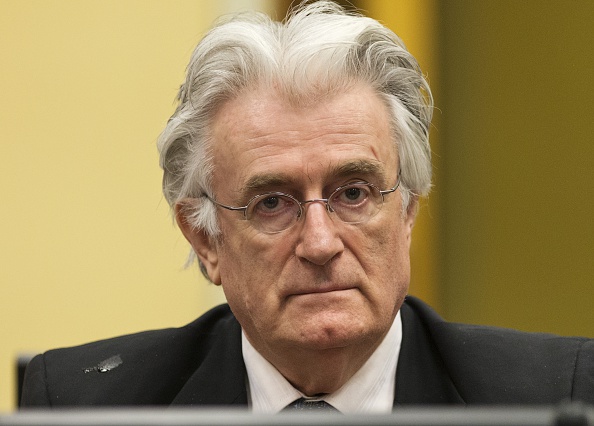THE HAGUE, Netherlands – A United Nations war crimes tribunal is passing judgment Thursday on former Bosnian Serb leader Radovan Karadzic, a landmark case against one of the alleged architects of Serb atrocities during Bosnia’s 1992-95 war that left 100,000 dead.

Karadzic will hear verdicts Thursday afternoon at the International Criminal Tribunal for the former Yugoslavia on 11 charges, including two counts of genocide. He faces a maximum life sentence if convicted.
Prosecutors hold Karadzic responsible as a political leader and commander in chief of Serb forces in Bosnia, who are accused of the worst atrocities of the war, including the 44-month deadly siege of Sarajevo and the 1995 massacre of some 8,000 Bosnian men and boys in the Srebrenica enclave, Europe’s worst slaughter since World War II.
The 70-year-old Karadzic insists he is innocent and says his wartime actions were intended to protect Serbs.
The trial is hugely significant for the U.N. tribunal and the development of international law. Karadzic is the most senior Bosnian Serb leader to face prosecution at the court housed in a former insurance company headquarters in The Hague.

Get breaking National news
If judges convict Karadzic, the case will strengthen international jurisprudence on the criminal responsibility of political leaders for atrocities committed by forces under their control.
Serbian President Slobodan Milosevic, accused of fomenting deadly conflicts across the Balkans as Yugoslavia crumbled in the 1990s, died in his cell in The Hague in 2006 before judges could deliver verdicts in his trial.
Karadzic’s trial is one of the final acts at the Yugoslav war crimes tribunal. The court, set up in 1993, indicted 161 suspects. Of them, 80 were convicted and sentenced, 18 acquitted, 13 sent back to local courts and 36 had the indictments withdrawn or died.
Apart from Karadzic, three suspects remain on trial, including his military chief Gen. Ratko Mladic and Serb ultranationalist Vojislav Seselj. Eight cases are being appealed and two defendants are to face retrials. The judgment in Seselj’s case is scheduled for next Thursday.
Karadzic was indicted along with Mladic in 1995 but evaded arrest until he was captured in Belgrade, Serbia, in 2008. At the time, he was posing as a New Age healer, Dr. Dragan Dabic, and was disguised by a thick beard and shaggy hair.
More than 20 years after the guns fell silent in Bosnia, Karadzic is still considered a hero in Serb-controlled parts of the divided country.
Last weekend, current Bosnian Serb leader Milorad Dodik opened a student dormitory named after Karadzic and had Karadzic’s daughter and wife unveil the plaque.
Speaking at the opening, Dodik called the trial “humiliating” and said those who fail to understand why Karadzic is hailed this way are “shallow-minded.” His words were followed by resounding applause.
—-
Associated Press writer Aida Cerkez in Sarajevo contributed.





Comments